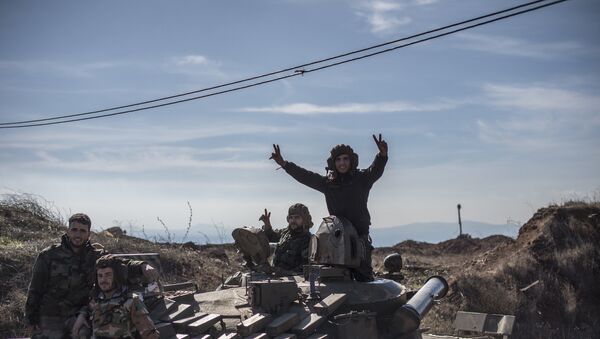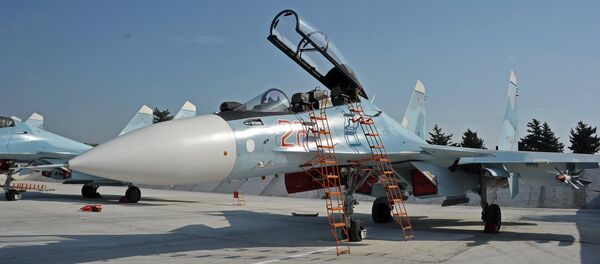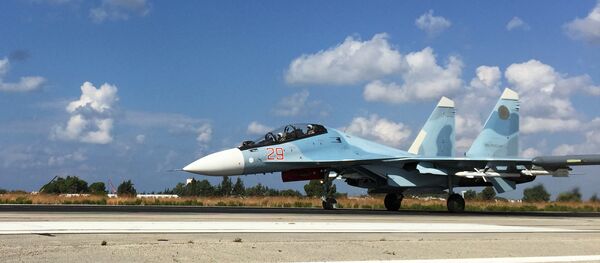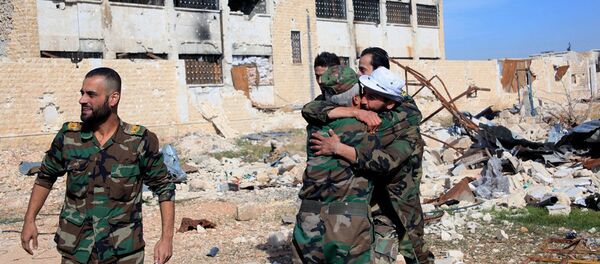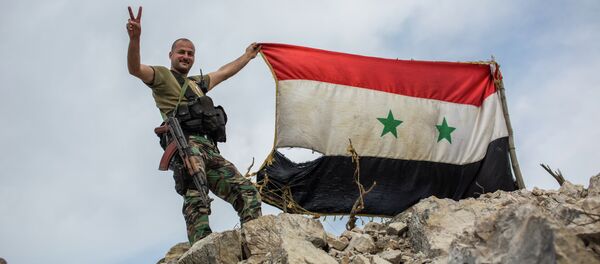In the last three months of 2015, the Russian Aerospace Defense Forces deployed to Syria, smashing thousands of terrorist targets and assisting the Syrian Army in launching a series of tactical offensives across the front, resulting in important victories in the provinces of Aleppo, Latakia, Hama, Idleb, Homs and the suburbs of Damascus.
According to a recent report by the Syrian General Staff, the support of Russian aviation has helped the Army launch a large-scale offensive for the first time in four years, resulting in the liberation of 80 towns and villages, and over 500 square km of territory. In the meantime, the Syrian Democratic Forces, a diverse coalition of Syrian anti-jihadist forces including the Kurdish YPG and YPJ, recently receiving Russian air support, has launched an offensive on the de facto Daesh capital of Al-Raqqah in northern Syria.
The task ahead of the Syrian-led anti-terrorist coalition is, admittedly, a daunting one. Nevertheless, they must be doing something right. According to a recent estimate by the Pentagon, the jihadists, Daesh in particular, are on the retreat, with the self-proclaimed caliphate losing as much as 40% of its territory in Iraq, and 20% in Syria.
At this point, when the situation for government forces has stabilized, but the road ahead remains difficult and fraught with dangers, Russian analysts have suggested that while 2016 may not see the conclusion of the war in Syria, it is at least likely to lead to the capture of the Daesh capital, to the closure of the Syrian-Turkish border, and to further victories against the terrorists on other fronts.
What an odd moment, then, for The Atlantic contributing editor Dominic Tierney to release an article headlined "What Happens If Russia Loses in Syria?" and subtitled "Putin's war could be unraveling."
"Russian media presented the mission as a heroic attempt to save the civilized world from Islamic terrorism. In Washington, however, Putin was widely seen as wading into a quagmire."
Citing a dusty piece in The Economist, which stated back in November that the Russian campaign in Syria would soon fail, "encourage Russia to give up on its proxy," and provide "a huge boost to the UN-backed peace talks" brokered by US Secretary of State John Kerry sometime early in the new year, Tierney warned that actually, "a loss for Putin" might only lead to the conflict's escalation.
"It is certainly easy to imagine the Russian intervention deteriorating," the journalist noted, citing an article from July, prior to the Russian intervention, where Syrian President Bashar al-Assad warned that the Syrian military was suffering from "fatigue" and "a lack of human resources."
With "the regime pull[ing] back to defensible territory," and "left in control of a rump coastal strip representing around one-sixth of the country [but 80% of Syria's population (!)]," Tierney suggested that ultimately, "Russian jets are not enough for victory. It would likely take tens of thousands of troops to recapture and hold cities like Aleppo and Raqqah."
Moreover, Tierney noted, "two can play at the great game of proxy warfare. Patrons of the Syrian insurrection, like Turkey and the Gulf states, may match Russian intervention by stepping up their own assistance to rebels – in the form, for example, of anti-aircraft missiles. During the 1980s, the Soviet Union's counterinsurgency war in Afghanistan unraveled in part because the CIA provided ground-to-air Stinger missiles to the mujahedeen."
And while the analyst's warning about Turkish or Saudi-provided anti-aircraft systems falling into jihadists' hands should by no means be taken lightly, they do serve to illustrate just where the parties to the conflict (including NATO and US allies) stand, and what exactly they are fighting for. Meanwhile, up to this point the only Russian military jet shot down over Syria was hit not by the jihadists, but by a Turkish jet.
"Putin's war" in Syria, Tierney suggests, "may very well fail. But if it does, will he make concessions and abandon his ally? If the Russian president acts rationally, he should cut his losses. Putin, however, may not act rationally."
How this all relates to the Russian air contingent's operation in Syria, which, as noted above, has resulted in a 'battlefield reversal' of another sort – one in which the dark tide of Islamist jihad has been reversed, remains unclear.
Focusing instead on 'Putin's likely defeat', Tierney suggests that having "cultivated an image of the father of the Russian people" charged with "restoring the country as a world power," the Russian president may move "the conflict into a dangerous new phase," including intensified airstrikes and the deployment of ground forces, something which Russian officials have stated would not happen from the outset.
Giving the plot away regarding the real reasoning behind his piece, the journalist noted that "if Russia's defeat could trigger hazardous escalation, this doesn't mean a Russian victory is preferable. After all, if Assad somehow assumed a winning position, why would he negotiate a compromise peace that recognized the interests of all Syrian groups?"
Ultimately, Tierney slyly concludes, "the optimal opportunity for a peace deal may be a situation in which Putin believes a decisive triumph is not possible, but he can still save face by spinning the outcome as a success. In other words, he needs a story to tell the Russian people about the positive results of the mission. This narrative doesn't need to be true, but it does need to have truthiness, or a seeming plausibility. And so, to get Putin out of Syria, the United States might need to play along by avoiding boastful claims of a major Russian debacle."
How exactly Washington plans to 'get Putin out of Syria' in a situation where the Syrian government is not only holding the line, but making advances against the jihadists, remains unclear. If it will be by expanding its proxies' support to jihadist and rebel groups fighting against Damascus, why not just come out and say it? Why beat around the bush and create eloquent propositions about a Russian 'peace with honor' in Syria – a peace dominated by Washington which Moscow would never accept anyway?

